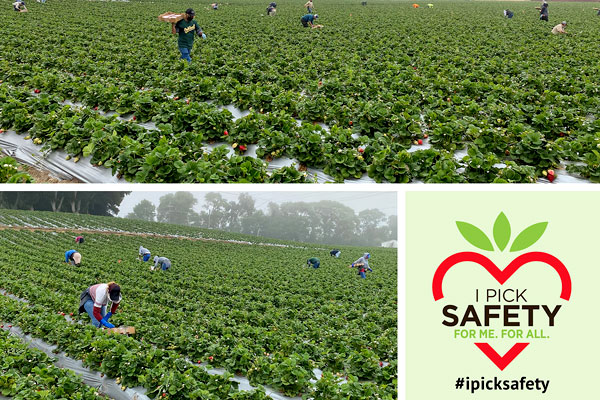
I Pick Safety is a new effort from the California Strawberry Commission to highlight farm worker safety, industry-leading training, and safety practices by emphasizing that everybody is responsible to always pick safety.
The commission’s new and ongoing efforts includes information on increased illness prevention training (at home and work), adopting crew and schedule modifications to implement social distancing during harvest, increasing the amount of hand washing facilities and hand sanitizing stations available in the field, sanitizing field facilities and work stations more frequently, and keeping a watchful eye on employee health.
Strawberry farmers and field supervisors are also working to quickly identify any workers who may be exhibiting illness symptoms and are being trained to help them isolate the individual to avoid spreading the virus to others. In California, most strawberry farm workers have paid sick leave as well as health insurance.
While COVID-19 presents new challenges, for many years farmers in California have operated under the most stringent standards in the nation, governing field sanitation and worker safety. These existing standards have provided an important basis for the I Pick Safety program as farmers move with expediency to adopt worker protection protocols to prevent the spread of COVID-19, maintain the health of farm workers and ensure the safety of the food supply. The increased training and attention should reassure consumers that California strawberries will remain available for their families to enjoy.
“Our new I Pick Safety logo reminds people to be safe and healthy, and it highlights why this is important,” said Carolyn O’Donnell, communications director of the commission. “Incorporating the tag line, ‘For Me. For All’, keeps the focus on every person’s role in protecting our families—from kids to seniors, along with the community at large.”
Over the past 60 days, commission staff have visited nearly every strawberry farm currently operating in California, and provided on-site training, signage and informative materials to keep farm workers healthy, highlighting the Centers for Disease Control guidance on creating a safer work environment and how to protect oneself through daily activities.
“Strawberries are one of the most labor-intensive crops, and strawberry farmers are working diligently to protect farm workers while providing a consistent supply of this nutritious fruit to consumers,” said O’Donnell. “Many strawberry farmers started in the fields planting and picking berries. This gives them a unique perspective and they are very appreciative and protective of their workforce.”
California’s 400+ family strawberry farms provide over 70,000 well-paying jobs and generate over $3.4 billion of annual economic impact.
The commission is highly respected for its award-winning food safety program, providing train-the-trainer, classroom and in-field training programs, as well as sustainability and a variety of workforce training and safety courses. As soon as the COVID-19 pandemic was identified, the commission began identifying how to keep workers safe and healthy, and working with government and medical experts to provide the best advice available to California strawberry farmers.
The commission’s website has become the go-to source for current information on the coronavirus/COVID-19 situation, specifically tailored for farms and farm workers (https://www.calstrawberry.com/en-us/Coronavirus). The website has a series of audio, video, visual aids, guidance, and other resources that are available in English and translated into Spanish and Mixtec to help farm workers stay safe on the job and at home. Many materials are printed and suitable for posting on the farms.

